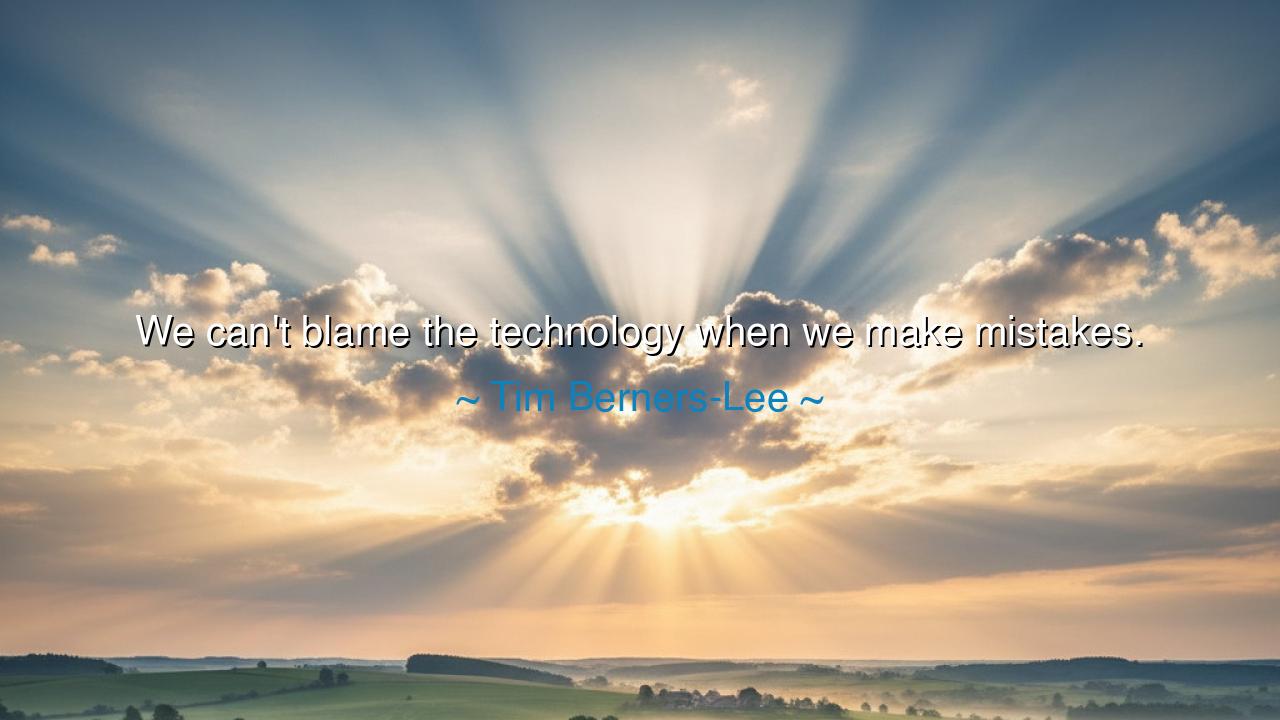
We can't blame the technology when we make mistakes.






Hear, O children of invention and error, the words of Tim Berners-Lee, the father of the World Wide Web, who spake with gravity: “We can’t blame the technology when we make mistakes.” In this utterance lies a timeless truth, though clothed in modern garb. For the tools of men, whether plow, press, or code, are but extensions of their own will. They are mirrors, not masters; servants, not sovereigns. When a hand misuses the blade, it is not the steel that is guilty, but the heart that wields it.
Mark well this wisdom: technology is neutral, awaiting the spirit of its user. Fire can warm the home or burn the village. The wheel can carry the weary or crush the weak. The Web itself can bind humanity together with knowledge, or entangle it in lies and cruelty. Thus Berners-Lee, who gave mankind a tool of unprecedented reach, remindeth us that the moral weight of mistakes rests not on the tool, but on those who wield it without care, foresight, or virtue.
Consider the tale of the printing press, the great marvel of Gutenberg. With it came enlightenment, the spread of scripture, science, and freedom of thought. But with it too came pamphlets of hate, propaganda, and division that set neighbor against neighbor. Did men blame the press itself? Some tried. But in truth, it was not the press that erred, but the hearts of those who used it for malice instead of truth. This lesson echoes across ages: blame not the tool, but the hand that turns it.
So too in the twentieth century, when the atom was split. Out of it came energy to power cities, heal the sick, and light the night. Yet out of it also came weapons that scarred the earth with fire. It is easy to say, “The science is to blame.” But the atom had no will of its own. It was the decisions of leaders, driven by fear and ambition, that shaped whether it gave life or death. Here again we see that responsibility cannot be shifted onto the tool—it rests ever on the soul of man.
Yet, O seekers, let it not be thought that blaming the tool is harmless. For when men lay blame on technology, they blind themselves to their own accountability. They learn nothing, they grow not wiser, and they repeat their errors. The sword will cut again, the fire will burn again, the Web will deceive again—until man confesseth, “The fault was mine. I misused what was given to me.” Only then can wisdom take root, and progress be guided by humility.
The lesson is plain: do not curse the tool when thou fallest short. Look first to thy own use of it. Train thy hand, discipline thy will, and shape thy intentions. Remember always that the noblest or the most destructive outcomes lie not in the tool itself, but in the choices of the one who wields it. Technology is a gift, but wisdom is the guardrail that directs it. Without wisdom, all tools may become weapons; with wisdom, even the simplest tools may change the world for good.
Practical is this counsel: when thou dost err with the tools of the modern age—when a message is misused, a post spread in haste, a device turned toward folly—resist the urge to say, “It is the fault of the technology.” Instead, ask: how could I use this better? What virtue was lacking—patience, restraint, discernment? Take responsibility, and use each mistake as a teacher. For it is not the tools that need taming, but our own restless spirits.
Thus remember Berners-Lee’s words: “We can’t blame the technology when we make mistakes.” For the plow, the press, the atom, the Web—all are but vessels. It is the soul of man that giveth them purpose. Take this wisdom, O children, and let it guide your hands, that your tools may build and not destroy, enlighten and not deceive. For in the end, the greatest technology of all is the disciplined heart, and the noblest invention is the life lived with responsibility.






AAdministratorAdministrator
Welcome, honored guests. Please leave a comment, we will respond soon